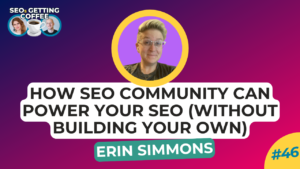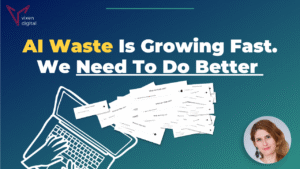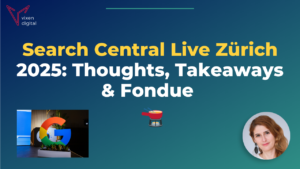In this episode of SEO’s Getting Coffee, Emina and Sean are joined by Yordan Dimitrov, SEO Manager at Reflect Digital and a leading voice in data-driven, behaviourally informed search strategy. The trio dive deep into how AI and large language models (LLMs) are reshaping search, what that means for visibility, and why it’s time to rethink the old-school metrics that have long dominated SEO.
From conversational search to the messy reality of measuring AI Overview traffic, this episode is a refreshingly honest (and occasionally nerdy) chat about the direction our industry is heading in and why it’s not business “as usual” (if that was ever a thing!) anymore.
Watch Video
How AI Is Transforming SEO Strategy | SEOs Getting Coffee Ep.41
SEO in the Age of AI: What’s Changed?
Yordan kicked things off with a clear reality check: SEO is no longer just about positions and clicks. With AI Overviews now occupying a significant portion of the SERP real estate, impressions and citations have become equally important.
The problem? We still don’t have solid first-party data to track it. Top SEO Tools like SEMrush, Ahrefs, and Similarweb are doing their best, but Google Search Console hasn’t caught up. So for now, SEOs are left piecing together data and making educated guesses.
Are AI Overviews Good or Bad? Depends Who You Ask.
Yordan sees the value in AI Overviews for certain queries, especially informational ones. Quick recipes, simple how-tos? Great. But when it comes to “Your Money or Your Life” (YMYL) queries – health, finance, critical advice – the risk of hallucination is still too high.
He pulled “the receipts”: 72% of AI Overview responses in the health vertical cited legitimate sources like NHS or .gov.uk sites. But that still leaves 28% that didn’t. Even 1% misinformation is too much when it comes to someone’s well-being.
Brand, Authority and the AI Filter
AI Overviews have made brand and topical authority more important than ever. If your site isn’t being cited, it’s likely because Google doesn’t view it as trustworthy enough. So, how can you increase your chances of getting cited there?
Yordan’s tips:
- Build authority through high-quality, well-structured content
- Use schema, alt text and accessibility features with purpose, not to game the system
- Track branded search traffic and revenue to demonstrate long-term value
Emina added a key insight: brands need to prioritise quality over quantity. If you’re getting fewer clicks, are they better clicks? Are they converting? That’s the real win.
GEO vs SEO: What’s the Difference?
GEO (Generative Engine Optimisation) is the latest buzzword in the industry. But does it mean anything new?
Yordan’s take: GEO is just SEO with more emphasis on conversational, precise answers. In other words, if you’ve been doing SEO well, you’re already doing GEO. The main difference is that LLMs need you to be incredibly direct. They’re pulling answers, not pages. If you don’t explicitly answer the question, you won’t get the mention.
The Reporting Revolution: RIP Old Metrics
One of Yordan’s main points is that we need to stop clinging to outdated KPIs, such as raw traffic or CTR. They’re no longer reliable indicators of success, especially with AI Overviews disrupting traditional SERPs.
Instead, SEOs should:
- Shift focus to revenue, conversions and quality visits
- Build custom dashboards in Looker Studio to track the metrics that matter
- Help clients understand that a drop in traffic isn’t necessarily a drop in value
It’s not about comparing apples to apples anymore. It’s about educating stakeholders on what success really looks like in 2025.
Tips to Optimise for AI Overviews and LLMs
Yordan shared a few practical tips for businesses who want to increase visibility in AI-driven search results:
- Reverse engineer the queries
Manually search your target phrases and analyse which sites are getting cited. - Be explicit in your answers
Don’t waffle. LLMs pick up clear, direct responses, not paragraphs of fluff. - Monitor brand mentions and long-tail questions
Use tools like AlsoAsked and Hugging Face datasets to get a feel for real user questions.
Experiment and test
It’s early days. What works now might not work next month. Keep experimenting.
Room 404: What Yordan Would Banish
Yordan’s pick for the SEO rubbish bin? The outdated obsession with legacy metrics.
He wants SEOs to let go of traditional organic KPIs and embrace more meaningful, client-relevant reporting. And with tools like Looker Studio and custom GA4 audiences, there’s really no excuse not to.
Final Thoughts
This episode offers a thoughtful perspective for SEOs still relying on traditional playbooks. With AI changing how people search and how answers are delivered, it’s a good time to reassess what we measure and why. That means exploring new KPIs, putting more emphasis on brand visibility, and staying open to how success is defined in an evolving search landscape.
If you’re still focused purely on clicks and CTR, this conversation will help you consider what else might be worth tracking.
For more insights and in-depth conversations on the latest in SEO and digital marketing strategies, stay stuned for upcoming episodes of “SEOs Getting Coffee.” Subscribe to our channel for regular updates and expert opinions.





